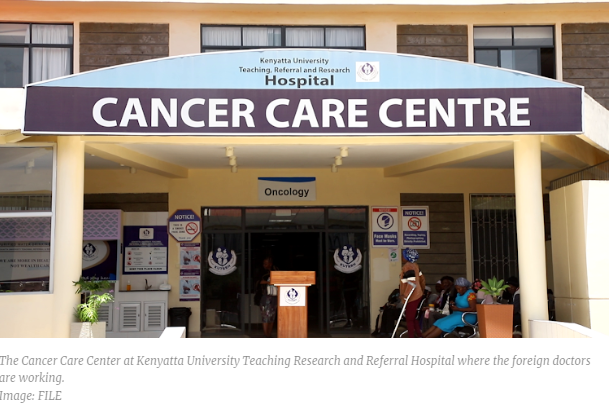EXPLAINER: How MoH, Max Foundation collaboration has enhanced cancer care in Kenya
The government has supported the initiative by streamlining administrative processes.

The Ministry of Health in collaboration with the Max Foundation have signed a Memorandum of Understanding to decentralise the Glivec International Patient Assistance Program (GIPAP) across the country.
This is to enhance access to essential cancer treatment.
The initiative is supported by Max Access Solutions (MAS) and aims to bring critical care closer to patients diagnosed with chronic myeloid leukaemia (CML) and gastrointestinal stromal tumors (GIST), particularly in far-flagged counties.
But how exactly is the initiative helping cancer patients?
Save on the cost of drugs
Through MAS, The Max Foundation has provided imatinib, a vital medication for treating CML, and GIST, free of charge to patients, ensuring access to treatment without financial pains.
The cost of imatinib presented a significant financial challenge for many Kenyan patients, with a monthly dose priced at approximately Sh270,000.
For most patients, this cost was prohibitive.
The MoH, through the Kenya Medical Supplies Authority (KEMSA), has provided clearance, warehousing, distribution and quality assurance services.
KEMSA has ensured that the medications reached the designated hospitals efficiently and managed last-mile delivery to guarantee availability at the point of care.
The order management for the medications has been coordinated through the National Cancer Control Program (NCCP), which ensured that the quantities requested by each facility were aligned with the number of patients they served.
The process is managed through the National Oncology Dashboard, a tool that tracks patient numbers and medication needs, ensuring accurate and timely distribution.
The government has supported the initiative by streamlining administrative processes, including granting tax exemptions for donated medicines.
To date, Nairobi Hospital has received 62,127 units of medication valued at Sh15,802,097,365, reflecting its role in hosting the majority of patients.
The Authority also addressed claims of issuing health products to Kenyans before proper testing. KEMSA asserted that all procured products undergo sampling, inspection, and testing in accordance with Quality Assurance procedures. The testing criteria vary depending on the product, with some requiring Pharmacopeia analysis, while others may only need visual inspection. KEMSA highlighted that it operates an ISO-certified laboratory and collaborates with agencies like the National Quality Control Laboratory (NQCL) for further product testing.
KEMSA was also accused of delivering Sh572 million worth of supplies to non-existent health facilities. In response, the Authority explained that it is responsible for procuring, warehousing, and distributing HPTs for prescribed public health programs. The 23 counties and 275 sub-counties in question have centralized stores where KEMSA delivered the specified HPTs. These centralized stores, although not actual health facilities, were created during the COVID-19 pandemic as delivery points at the request of counties.
KEMSA refuted claims of sending supplies worth Sh56 million to private hospitals and billing counties or the Ministry of Health (MoH) for them. The Authority clarified that ARVs are delivered free of charge, courtesy of development partners such as the Global Fund and USAID, as part of efforts to combat HIV/AIDS, tuberculosis, and malaria.
Regarding the reported loss of Sh168 million due to a change in Global Fund procurement processes, KEMSA acknowledged the loss of revenue from procurement fees when the Global Fund shifted procurement to Wambo.org. However, KEMSA stated that it still manages the warehousing and distribution of mosquito nets, earning fees for these services.
Finally, KEMSA addressed concerns about procurement irregularities, stating that all contract extensions were granted in compliance with Section 88 of the Public Procurement and Asset Disposal Act (PPADA) 2015, as revised in 2022. The Authority attributed delays in order processing to budgetary constraints, which were prioritized for pending bills. KEMSA asserted that all procurement during the financial year was conducted in strict compliance with the PPADA 2015, using various procurement methods as outlined in the Act.
The Authority maintained that any excessive procurement, including the Sh3.5 billion in question, was based on projected demand at the time, with changes in demand leading to either overstocking or understocking of certain commodities.